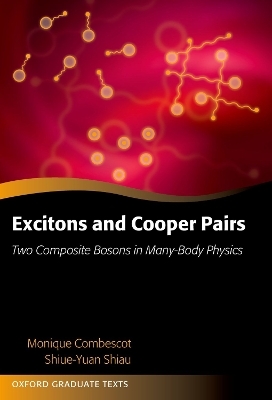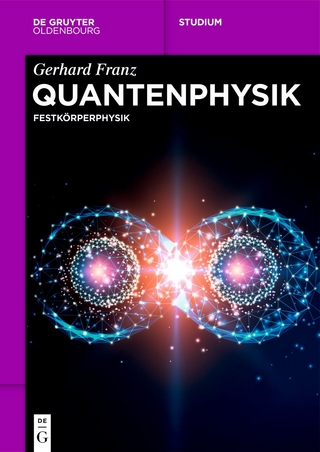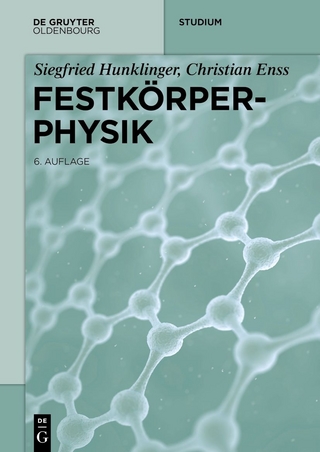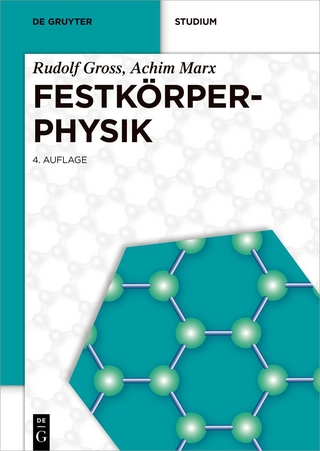
Excitons and Cooper Pairs
Oxford University Press (Verlag)
978-0-19-891471-6 (ISBN)
This book bridges a gap between two major communities of Condensed Matter Physics, Semiconductors and Superconductors, that have thrived independently. Using an original perspective that the key particles of these materials, excitons and Cooper pairs, are composite bosons, the authors raise fundamental questions of current interest: how does the Pauli exclusion principle wield its power on the fermionic components of bosonic particles at a microscopic level and how this affects their macroscopic physics? What can we learn from Wannier and Frenkel excitons and from Cooper pairs that helps us understand "bosonic condensation" of composite bosons and its difference from Bose-Einstein condensation of elementary bosons? The authors begin with a solid mathematical and physical foundation to derive excitons and Cooper pairs. They further introduce Shiva diagrams as a graphic support to grasp the many-body physics induced by fermion exchange in the absence of fermion-fermion interaction - a novel mechanism not visualized by standard Feynman diagrams. Advanced undergraduate or graduate students in physics with no specific background will benefit from this book. The developed concepts and formalism should also be useful for current research on ultracold atomic gases and exciton-polaritons, and quantum information.
Monique Combescot is a former student from the École Normale Supérieure in Paris, France, (Maths and Physics major). In 1973, she obtained a PhD in many-body theory from the University of Paris, France (adviser Prof. Ph. Nozières). After a 2-year postdoc at Cornell University, USA, she returned as a research member of the CNRS in Paris, permanently. She likes teaching very much — she has been first at the "Aggregation de Physique". She has taught many undergraduate courses at the University and at Engineer Schools in Paris. Over the last two decades, she also gave various courses at the graduate level, in Paris and in many other places in the world. This book is based on one of these lectures. Shiue-Yuan Shiau obtained B.S. in 1998 and M.S. in 2002 from National Taiwan University. He received his PhD in physics in 2007 from the University of Wisconsin-Madison. After postdoctoral positions in INAC/SPSM Commissariat à l'Energie Atomique de Grenoble, France, and Academia Sinica, Taipei, Taiwan, he is research assistant professor at National Cheng Kung University, Taiwan.
1: Introduction
Part I: Excitons
2: The Exciton Concept
3: Wannier Excitons
4: Frenkel Excitons
5: Elementary Bosons, Wannier and Frenkel Excitons, and Frenkel Excitons
Part II: Cooper Pairs
6: The Cooper Pair Problem
7: The Bardeen-Cooper-Schrieffer Approach
8: The Bogoliubov Approach
9: The Gorkov Approach
10: Richardsib-Gaudin Exact Solution
11: Links Between Cooper Pairs and Excitons
Part III: Particles Related to Excitons
12: Trions, Biexcitons and Polaritons
13: Trions
14: Biexcitons
15: Polaritons
Part IV: Bosonic Condensation
16: From Elementary Composite Boson Condensates
17: Elementary Bosons
18: Composite Fermions
19: Composite Bosons
Appendix A : Some Mathematical Results
A.1: The Kronecker symbol and delta function
A.2: Fourier transform and series expansion
A.3: Coulomb scatterings
Appendix B : The Second Quantization Formalism
Appendix C : The Hamiltonian for Wannier Excitons
C.1: The semiconductor Hamiltonian in first quantization
C.2: Bloch states
C.3: The semiconductor Hamiltonian on the Bloch basis
Appendix D : The Valence Electron Operator Versus the Hole Operator
D.1: Valence electron absence
D.2: Spin 1/2
D.3: l=1 orbital momentum
Appendix E : "The Coboson Bible"
Appendix F : Direct Coulomb Scattering for Wannier Excitons
F.1: Creation potential
F.2: Direct Coulomb scattering
F.3: Symmetry properties
Appendix G : Concerning N Ground-State Wannier Excitons
G.1: Normalization factor
G.2: Hamiltonian mean value
Appendix H : Photon-Semiconductor Interaction
H.1: Electromagnetic field in vacuum
H.2: The electron Hamiltonian in a photon field
H.3: Linear Coupling
H.4: Quadratic coupling
H.5: Complex polarization vectors
Appendix I : Photon-Exciton Interaction
I.1: Photon-exciton coupling
I.2: The sum rule between photon-exciton couplings
References
Index
| Erscheinungsdatum | 08.05.2024 |
|---|---|
| Reihe/Serie | Oxford Graduate Texts |
| Verlagsort | Oxford |
| Sprache | englisch |
| Maße | 171 x 245 mm |
| Gewicht | 954 g |
| Themenwelt | Naturwissenschaften ► Physik / Astronomie ► Festkörperphysik |
| Naturwissenschaften ► Physik / Astronomie ► Quantenphysik | |
| Technik ► Elektrotechnik / Energietechnik | |
| ISBN-10 | 0-19-891471-7 / 0198914717 |
| ISBN-13 | 978-0-19-891471-6 / 9780198914716 |
| Zustand | Neuware |
| Haben Sie eine Frage zum Produkt? |
aus dem Bereich


